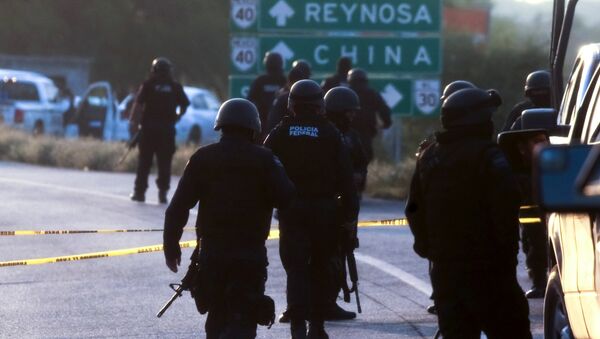“Cooperation, yes, intervention, no,” Lopez Obrador told reporters, referring to the US leader’s statements.
Trump made the comments during an interview with former Fox News host Bill O'Reilly. "I will be designating the cartels,” Trump stated.
"I have been working on that for the last 90 days. You know, designation is not that easy, you have to go through a process, and we are well into that process," Trump added.
Calls to take action against Mexico’s drug cartels have intensified in the past month among conservatives after nine women and children, members of a Mormon community and dual US-Mexican nationals, where killed in an ambush in northern Mexico. Drug gangs are believed to be responsible for their deaths.
“By designating drug cartels as terrorists the lines between civilian and military responses are going to become much softer,” cautioned Alexander Gillespie, Professor of Law at the University of Waikato, New Zealand. He thinks that this won’t stop drug-related crimes or the supply of drugs to the US.
“The decision to classify drug cartels as terrorists escalates the war on drugs. Although this will give President Trump more power in this area, it will blur the boundaries between civilian and military responses, and is very unlikely to make the problem better in terms of reduced supply of drugs or deaths associated with this terrible trade.”
Mexico’s Sovereignty Concerns
Mexico’s Foreign Minister Marcelo Ebrard is in charge of negotiations with Washington and said on Wednesday that he’s already talking to the US side on the issue, but did warn that the Latin American nation will protect its sovereignty.
“Mexico will never accept any action that violates our national sovereignty," Ebrard tweeted. “We will act firmly. I have transmitted our position to the US, as well as our resolve to face international organized crime. Mutual respect is the basis for cooperation.”
While Mexico is not ruling out cooperation with the United States on the issue, a lot will depend on what the Americans will propose, Professor Gillespie noted.
“If it meant something like the United States wanting their military to independently fly drones over their country to target drug cartels, I doubt they will consent. If it means measures like greater cooperation between the law-enforcement agencies, beyond what already exists, then yes, perhaps cooperation is possible. But, it should be noted, many of the measures - deportation, financial controls, stiff penalties - already exist,” he explained.
On the other hand, the professor believes that a lot also depends on what the United States tries to do in Mexico without Mexican permission.
“In some instances, governments may invite the civil and military authorities in to help with a particular situation. Civil cooperation, such as between police forces is common, but set down with carefully agreed rules. Without that consent, it is illegal to cross the border and intervene,” he stressed.
‘Hugs, not Bullets’
Mexico’s president has been criticized for what some consider to be his soft approach to fighting cartel violence. But Lopez Obrador, who took office last December, insists that tackling poverty and corruption and not waging war with the drug gangs will produce better results.
However, his “abrazos, no balazos” policy, meaning “hugs, not bullets,” has yet to produce results.
In 2018, Mexican authorities said they opened 33,341 murder investigations, the highest number ever.
At the same time, the Mexican government does not consider it necessary to equate drug cartels with terrorist groups. Entrepreneur and former Republican candidate for the US House in Arizona, Sergio Arellano, says that they have reasons for it, as the cartels are very powerful.
The designation could also complicate possible negotiations between Mexican authorities and the cartels.
“The Mexican government has a choice about whom they negotiate. If they choose to empower the cartels knowing that choice would be frowned upon by the majority of hard-working honest Americans, they have to live with the consequences of that,” Arellano said.
“They may have to negotiate with criminals, but the vast majority of Americans would not be in favour of our government doing so,” he pointed out.
Professor Gillespie, in his turn, noted that “once one drug cartel is designated, the precedent has been set.”
“The thing to watch for is whether America attempts to take their domestic designation of cartels as terrorists to the other regional and international bodies, and attempts to imply the designation overseas,” he concluded.



